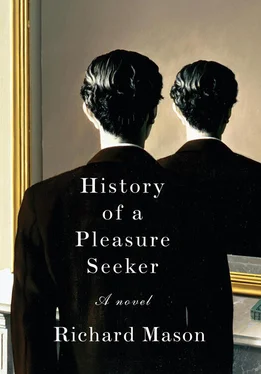“Only a fool would do that,” said Didier. He was sitting on the radiator in the attic bathroom, in his dressing gown, while Piet lay submerged to his neck in the water Didier had just vacated. “You can’t let her know that you know she’s keen on you. Especially if you’re going to reject her.”
“But I can’t let it go on this way forever. If her father suspects—”
“Suspicion’s one thing. If you say anything, it’ll go badly wrong.”
Piet agreed with his friend, so he continued to feign obliviousness as Constance’s attentions became more frequent and less subtle. When, one day, she fainted at tea and compelled him to lift her in his arms and deposit her on the sofa, a new and horrifying possibility occurred to him: that she might make an overt declaration that necessitated a plain response. What could he possibly say that would close forever the possibility of a liaison while sparing her the kind of embarrassment that so often demands vengeance? He did not wish to be her enemy. As the danger increased he began to prepare a little speech on the subject of his religious scruples, which would not permit him, etc. etc. But in the event this was not necessary, for two days later, as Didier Loubat and Hilde Wilken served the coffee and petits fours, Constance put him on the spot in a public yet deniable manner that demanded respect.
His first thought, as she told him he was handsome and that he pleased her, was relief that her father was not there to observe the interaction; but this was followed by the certainty that, if he did not make himself clear to her now, he might not have the opportunity to do so again without Maarten present. “Would you like to sing?” he asked, playing for time.
“I’d enjoy it much more if you would,” said Constance.
Piet hesitated. The erotica of Carmen was not at all appropriate. It would be better to speak through music, but what could possibly serve? His choice should be moving, to avoid making light of Constance’s feelings, but not melodramatic. Ideally it should end cheerfully but convey an emphatic rejection. What on earth …?
And then, as inspiration so often did, it came as he needed it. He raised his eyes to Constance’s and very, very gently played the first haunting chords of La Traviata .
Jacobina, who had observed the entire exchange, smiled and bent over her embroidery. Louisa was impressed too, though she also experienced a strange and contradictory desire to puncture Mr. Barol’s improbable perfection, and see him fail. Hilde Wilken had left the room, and Didier, who never went to the opera, did not understand until Piet explained later. But Constance understood and as she listened to Piet play the overture to a story about disastrous liaisons between the classes and the tragedies they lead to, and as he looked at her firmly, making his meaning plain, she abruptly abandoned the effort of seducing him — because she preferred to renounce a challenge rather than fail at it. She picked up a copy of La Mode Illustrée and buried herself behind it and later submitted to Louisa’s scalding mockery without much minding. For this was Constance Vermeulen-Sickerts’ essential genius: that she was able to desist from desiring what she could not have — a trick that, had they emulated it, might have saved her male acquaintances much misery.
Piet was right: Maarten Vermeulen-Sickerts was watching his behavior closely, and when Maarten saw him resist Constance’s assault he too wondered whether he was a uranist. But no. He was not like Mr. Blok. This made the young man’s restraint all the more creditable and induced in Maarten a warm paternal regard he demonstrated in all sorts of touching ways. He explained to Piet how successful enterprises are run: with iron confidence, flexibility, and a willingness to innovate. He took him over every inch of the house, describing its contents with the delight of the self-made connoisseur, and lingered in particular over the cabinets in his office and the statues of Paris, Athena and Aphrodite that reigned over the staircase hall.
It was Paris’ task, at the request of Zeus, king of the gods, to decide which of the goddesses was the most beautiful. “And that is why,” said Maarten, pointing upwards, “I never take sides between my daughters and my wife. Paris’ decision started the Trojan War.”
It did not occur to Maarten, as he watched Constance lay unsuccessful siege to Piet Barol and steeled himself to intervene if necessary, that it was not his daughters’ virtue the young man threatened but his wife’s. Jacobina betrayed no indication of remembering Piet’s first afternoon in the house, but she thought of it constantly and was not entirely relieved that Piet seemed to have forgotten it.
Jacobina was a woman who had lived her life correctly, even strictly, but this was because she had gradually lost the imagination to conceive of it otherwise and not the result of any great interior piety. Her youth’s sole act of rebellion had been to accept the proposal of the cunning, boisterous Maarten Vermeulen, when she might have made a titled alliance. This had been rewarded by her husband’s runaway success. But she had not been very impulsive since and Piet’s arrival made her rather regret this.
Jacobina had gone to bed on his first night quietly proud that a handsome young man had stared so saucily at her. The next morning she was horrified by what had happened and resolved to censure any future impudence. At first she was relieved when no opportunity to do so arose. For several weeks she rehearsed the chilling speech she would deliver when Mr. Barol made protracted eye contact with her again. When he did not she grew rather indignant, and her contradictory emotions annoyed her. She began to embroider a great deal, which gave her something to do with her hands in the evening while Piet and Maarten sang duets at the piano. During these impromptu performances, she found herself noticing the young man’s physique and contrasting her husband’s unfavorably with it. After one evening of particular study, she began to imagine Piet naked, and then to do so with a frequency that alarmed her. She rejoiced when Constance set out to seduce him, because any incorrectness on Piet’s part would get him dismissed and remove the temptation forever.
But Piet Barol did not behave incorrectly; and just once or twice she thought that it was at her, rather than her charming daughter, that he looked with the hunger she felt and tried not to show. She dreamed about him for the first time a month after his arrival, and in the dream he put his strong young body at her disposal. She woke from it aroused, and when Maarten had left she dismissed Agneta Hemels and spent the morning in bed, defying the prohibitions of her youth and pleasuring herself until the lunch bell sounded.
It was the custom of the household to attend church together and to sit in the same pew — for on Sundays all men are equal in the eyes of God. One Sunday near the end of May, Jacobina woke from a dream of wild abandon that chimed with the cheerful weather and made her wish, as Agneta did her hair, that no one, not even God, were watching her.
She found the servants waiting in the hall and Piet’s smell provoked a spasm of longing. To have the fantasy companion of the night incarnated in all his earthly glory was an unfair temptation on the Sabbath morning. She turned from him and got into the Rolls-Royce, calling rather sharply for her daughters. Maarten was already in his seat and said “Good morning, my love” with a tenderness that painfully stimulated her conscience.
The clash of unsatisfied desire and self-reproach put Jacobina in a filthy temper. She said nothing during the short drive to the Nieuwe Kerk and once there hurried through the throng, bowing briefly to her friends, and sank to her knees in the Vermeulen-Sickerts’ pew. But Jacobina was not praying. She was thinking about Piet Barol, and the sound of his deep, happy voice inquiring after Mrs. de Leeuw’s rest made it hard to banish the image of him, bare chested and ready, that had followed her from her sleep.
Читать дальше












